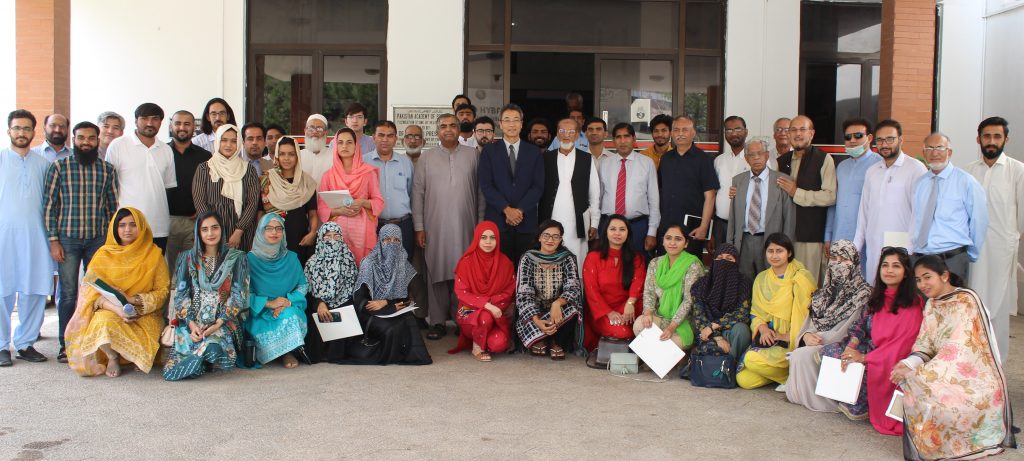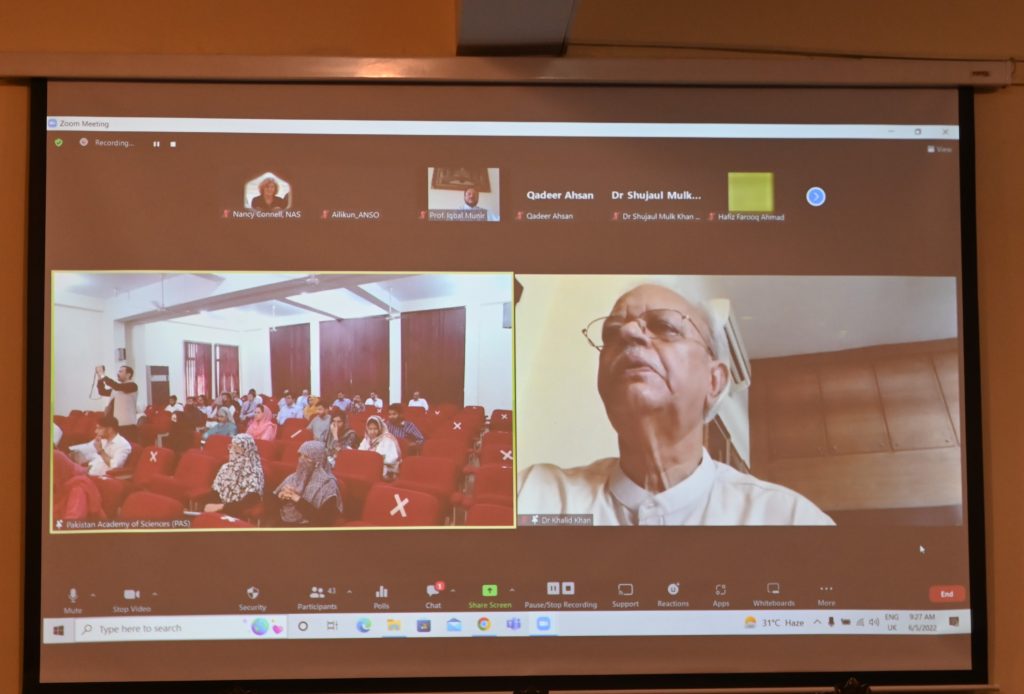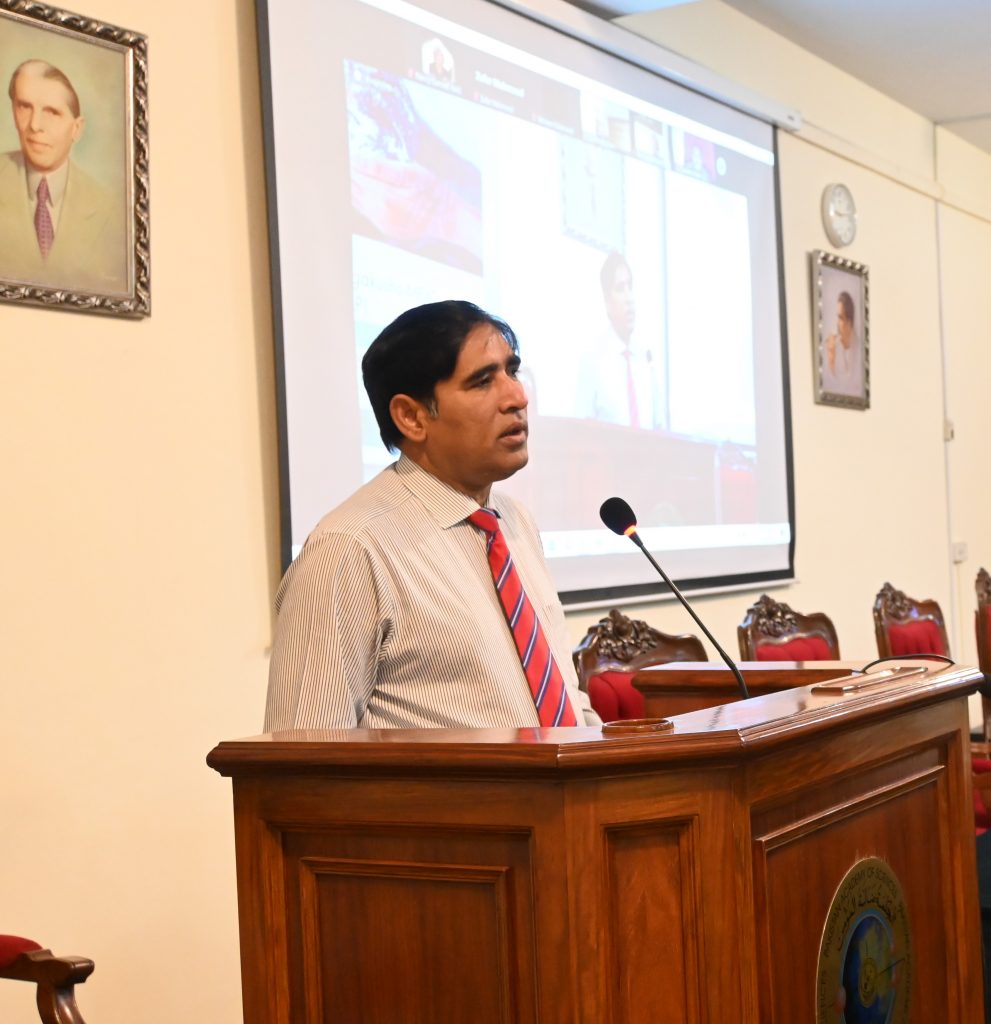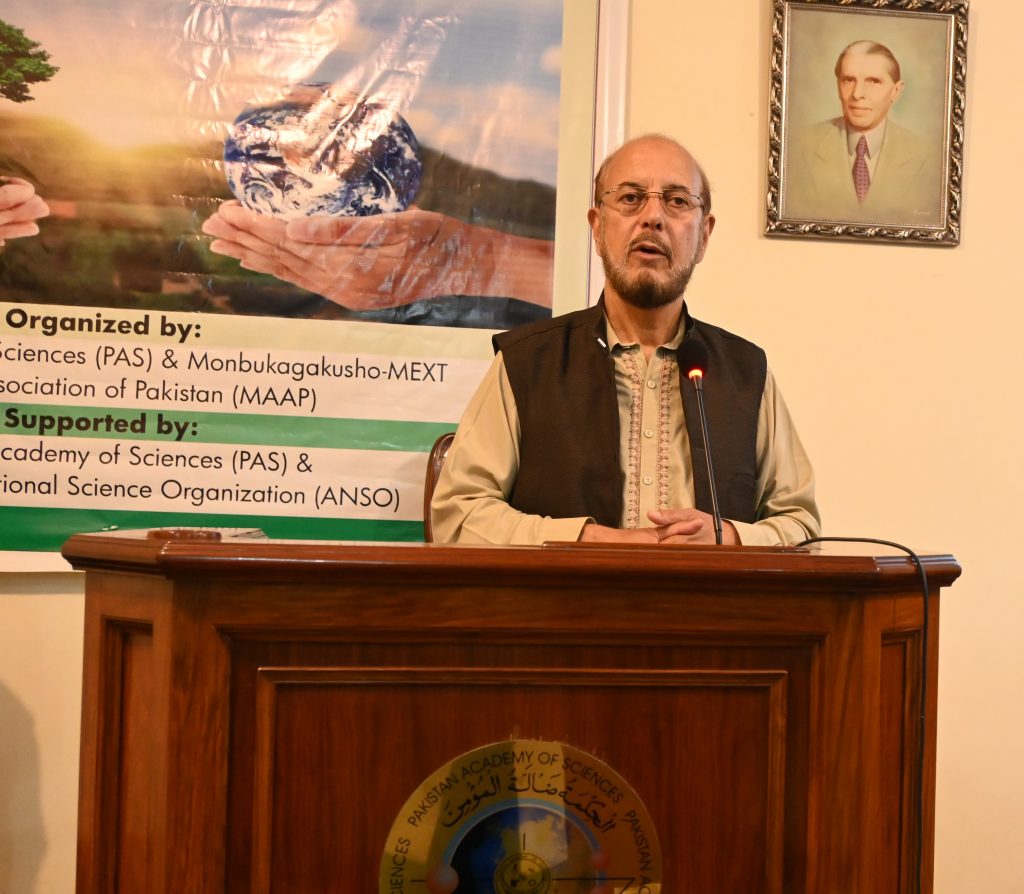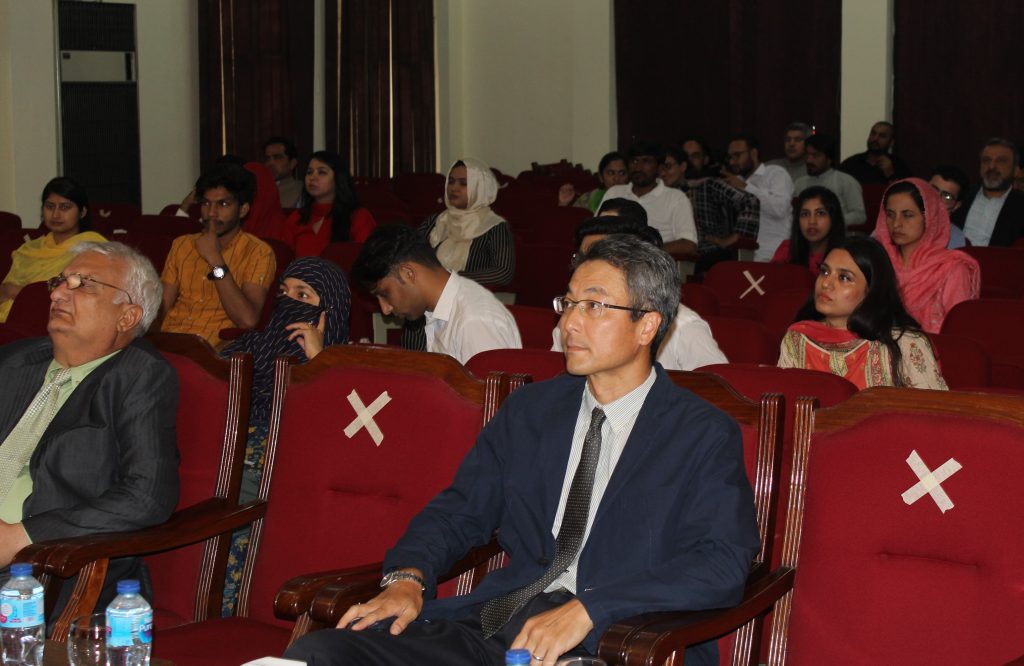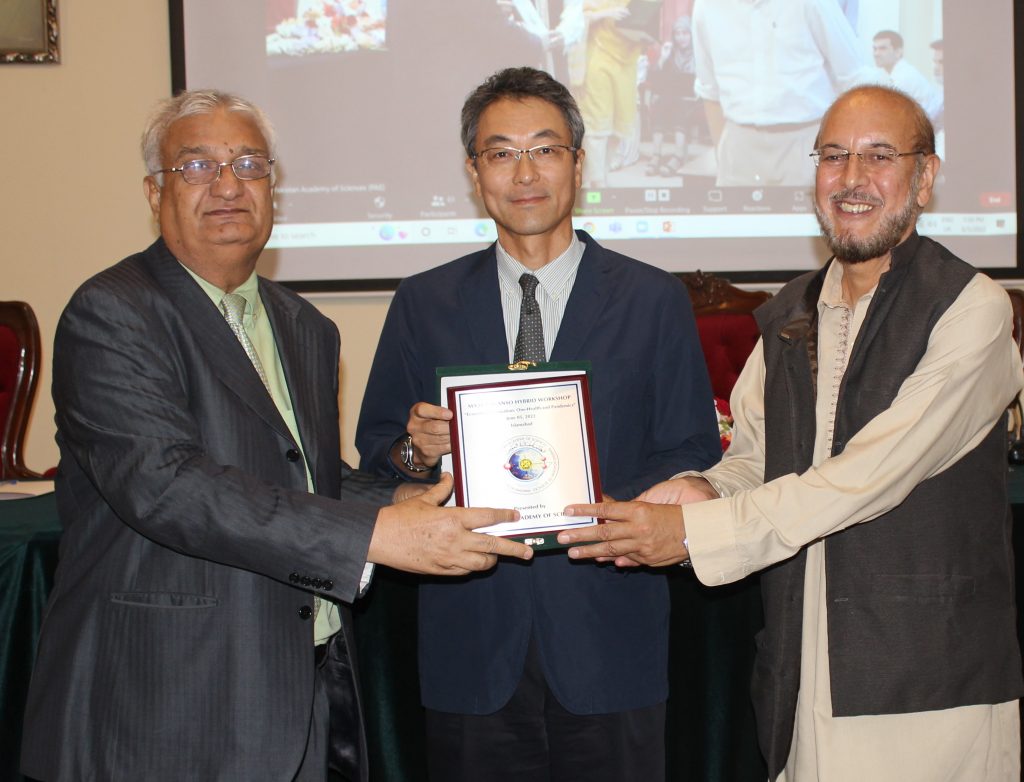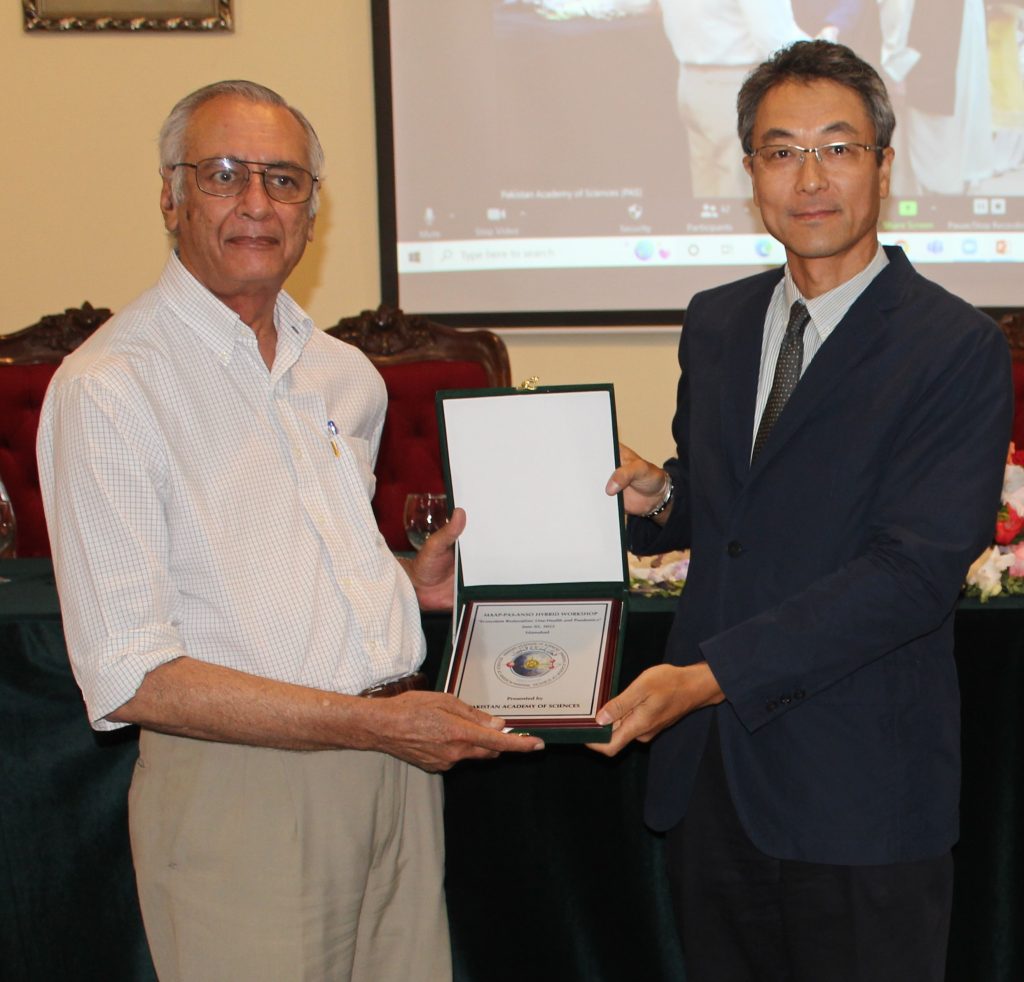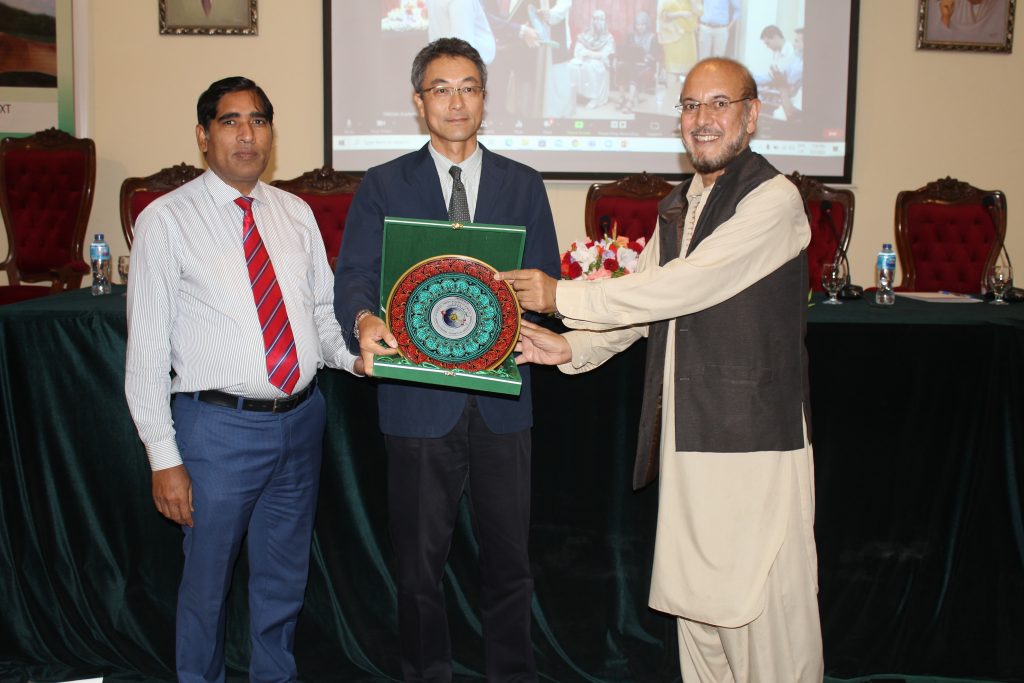MAAP-PAS-ANSO Hybrid Workshop on “Ecosystem Restoration: One-Health and Pandemics” (June 5, 2022)
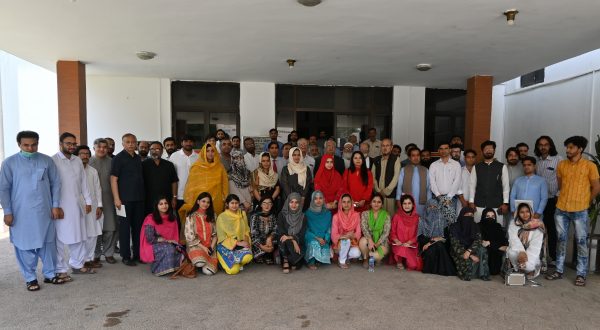
World environment day is celebrated on 5th June every year to bring awareness among the masses about the importance of environmental conservation. This year the slogan for this day was “Only one Earth’’ which means that we have only one planet to live on and we need to live sustainably in harmony with nature. To celebrate world environment day, a hybrid workshop on “Ecosystem Restoration: One-Health and Pandemics” was organized by the Pakistan Academy of Sciences (PAS) in collaboration with the Alliance of International Science Organizations (ANSO) and MEXT Alumni association of Pakistan (MAAP). The theme of this workshop emphasized on connecting human, animal and environmental health in a balanced way so that none of them is undermined because the human-health is closely connected to the health of animals and our shared environment. The resource persons in the workshop were leading foreign experts from different countries i.e., USA, UK, Japan, China, and Pakistan. They shared their views and their research outputs and discussed development in the area of one health and pandemic. This workshop included two technical sessions.
The Chief Guest of the inaugural session of the hybrid workshop was Prof. Dr. Khalid Mahmood Khan (President, PAS). Moderators of the two technical sessions were Prof. Dr. Muhammad Mukhtar (Vice Chancellor, National Skills University (NSU), Islamabad) and Dr. Shaukat Hameed Khan (Fellow PAS & Ex-Coordinator General COMSTECH).
Prof. Zabta Khan Shinwari (Chief Organizer) was the moderator of the Inaugural Session. Prof. Dr. Zabta Khan Shinwari expressed his warm appreciation to the members of the organizing committee, speakers, the Pakistan Academy of Sciences, and especially ANSO for their collaboration to organize this hybrid webinar. Prof. Dr. Tasawar Hayat (Secretary General PAS) welcomed all the guests, speakers, organizers, and workshop participants. He appreciated all the efforts of MAAP, PAS, and ANSO to organize this series of webinars and emphasized on organizing other similar webinars in the future.
In the Inaugural Address, Prof. Dr. Khalid Mahmood Khan (President PAS) shared his views about the importance of a healthy ecosystem and that one health has changed the conventional approach that only human health is of prime importance. He supported this idea by sharing the fact that 60% of human infectious diseases are of zoonotic origin. Environmental changes and anthropogenic factors are exacerbating the problem of ecological imbalance. He highlighted the challenges and loopholes in managing the current pandemic (Covid-19) and advocated the need for strong collaboration among the scientific community and state institutions. In his introductory remarks,
Technical Session I was chaired by Prof. Dr. Mukhtar (Vice Chancellor, National Skills University, Islamabad). First speaker, Prof. Dr. Zabta Khan Shinwari briefly explained “Biodiversity loss: One health and pandemic.” He elaborated the grave concern of biodiversity loss and stressed on its conservation by quoting “No one is safe until everybody is safe”; which highlights the importance of timely holistic actions to regulate animal trade and conserve wildlife biodiversity. He also considered Covid-19 a blessing in disguise as it has given us a wake-up call to take measures for environmental protection so that we could avoid such lethal pandemic(s) again, or at least could prepare ourselves for any environmental degradation of a lesser degree.
Prof. Nancy Connell (US-NAS) (The National Academy of Sciences, USA) introduced a very emerging domain of technology Artificial intelligence AI that can be incorporated into the field of biological conservation. The topic of the talk was “AI and biodiversity”. As she started by a very powerful quotation by E O. Wilson “If there is danger in human trajectory, it is not so much in the survival of our species as in the fulfillment of the ultimate irony of organic evolution: that in the instant of achieving self-understanding through the mind of man, life has doomed its most beautiful creations.” She presented the highlights of her research project that how they have used artificial intelligence to monitor and regulate biodiversity and also in the improvement of conservation and sustainable use of biological and ecosystem values in a rapidly changing and resource-limited world.
Dr. David R. Franz (US-NAS) elucidated the importance of insurance policy for the future in a rapidly changing and complex world to alleviate the effects of future pandemics. He stressed the idea by saying that “the planning is more important than the plan”. The topic of his presentation was “Insurance policy for the future” he mainly elaborated the drawback of human behavior that forgets the harsh past without doing anything to save the future generation. His presentation mainly consists of how we can focus on the one health concept that can improve the living conditions of both humans and animals with aid of science and technology. Lastly, he emphasized imposing a national strategy to countermeasure any future pandemic.
Dr. Tim Traven (Co-founder, Chrome Biorisk management consulting) talked about “Zoonosis: Can we mitigate risks species jumps. He stated that zoonosis is the evolution in action, and evolution requires replication that is further enhanced by selective pressure. In his lecture, he explained the stages of viral replication such as attachment, penetration, synthesis-coating, release, genomic assemblage, and finally viral protein synthesis. Further, he stated that there is no evolution possible without selective pressure, and no selective pressure is possible without replication. Such evolution and selective pressure can lead to pathogen spillover and viral propagation.
Dr. Niryoshi Shinomiya (President, National Defense Medical College, Japan) talked about the “Advances in the life sciences and the risk of pandemics”. He also put forward the highlights of research projects on the possibility of artificial synthesis of various viruses and expressed concern that the eradicated viruses such as the smallpox virus can reemerge due to its chemical synthesis. Professor Niryoshi Shinomiya also highlighted the need for and importance of Biosafety and biosecurity with the installation of biological safety levels in the labs worldwide. His presentation further contains a timeline of the human warfare threats that shows traditional agents during the 1970s, genetically modified traditional agents during the 1990s, and synthetic biology recombinant genetics and genome editing after the 2000s. Additionally, he also illustrated trends in life science technologies from the past twenty years and emphasized on regulating technologies like genome editing, etc.
Technical Session II was chaired by Dr. Shaukat Hameed Khan (Fellow PAS & Ex-Coordinator General COMSTECH). The first speaker of the second session was Dr. Muhammad Ali (Principal investigator, ANSO Project) who gave a brief overview of “Bats viruses and Pandemics”. He discussed that bats are one of the largest reservoirs of mammalian viruses due to their migratory behavior, seasonal hibernation & roosting, altered antiviral immunity, and unique anti-inflammatory and proinflammatory responses. Some of the bat-borne viruses have spread to the human population by crossing specie-barriers. He gave an overview of global ongoing research on bat viromes and discussed current challenges. In concluding remarks, he emphasized the need for close and apolitical collaborations among scientists in combating pandemics.
Dr. Qadeer Ahsan (Fleming fund) discussed the pandemics with respect to Pakistan. He emphasized on the antimicrobial resistance aggravated the covid-19 pandemic situation. He discussed the role of the Fleming Fund to improve the AMR surveillance and support a national action plan to inform policy and delivery of healthcare in Pakistan. He also discussed the clinical stewardship program initiated by the fleming fund and highlighted its main objectives. He also emphasized on laboratory infrastructure enhancement, federal and provincial interventions, system development, and disease surveillance. He also mentioned the results of the Knowledge attitude and practice (KAP) survey.
Dr. Quaid Saeed (CEO, Islamabad Healthcare Regulatory Authority) shed light on the role of IHRA in the management of the Covid-19 pandemic. In his message, he discussed different strategies that were adopted by them to cope with emergencies. He also discussed that health regulatory authorities like IHRA are under pressure during the pandemics for taking important decisions regarding controlling the pathogen, vaccine approvals/strategies, and regulating healthcare-related issues. IHRA managed the complaints from the masses regarding malpractices by the hospitals and diagnostics facilities.
Prof. Dr. Li Cui (Institute of Urban Environment, CAS) briefly explained her research projects on antimicrobial resistance and one health. She focused on the environmental dimension of antibiotic resistance and reservoirs of AMR that are neglected somehow. Initially, she explained the general concept of antibiotic resistance, followed by the severity of global antimicrobial resistance and how it leads to a silent pandemic by slowly ending millions of lives worldwide. she elaborated that one health is essential not only to avoid any future pandemic but also to the major threat of antibiotic resistance. She stated that increased contact of humans with wild animals can enhance antibiotic resistance and transfer these into the food chain which can affect the primary and secondary consumers in the food chain.
Following Dr. Li Cui, Dr. Shahbaz Khan (UNESCO, Beijing) presented the concept of open science for all-leaving no one behind. The implementation of this idea needs a transparent, inclusive, democratic, and sustainable approach. Research findings should be more accessible, and for that, we need open communication, open knowledge, shared research, infrastructure, open labs, crowdsourcing, and crowd funding, etc.
Lastly Prof. Lijun Shang and prof. Malcolm Dando (London Metropolitan University, UK) talked about the topic “Is there sufficient educational resources for the implementation of Tianjin Biosecurity guidelines for codes of conduct for life scientist result and survey” in their presentation of some of the backgrounds that leads to the development of the Tianjin biosecurity guidelines. That includes education and training and how it is promoted by Pakistan and China relationship.
The Chief Guest of the concluding session was H.E Ryuji IWASAKI, Counsellor, Embassy of Japan in Pakistan. The session was concluded by Prof. Dr. Tasawar Hayat (Secretary General, Pakistan Academy of Sciences). He expressed his gratitude to worthy Chief Guest H.E Ryuji Iwasaki for sparing his precious time to grace this Workshop. In total, 11 lectures were presented by eminent local and foreign speakers in two technical sessions of the hybrid workshop while a concluding message was presented on behalf of Dr. Fazal Hadi, Chair Board, Islamabad Healthcare Regulatory Authority. In addition, a few posters were also presented by participants of the workshop. For this, I am indebted to all the speakers of the workshop for their thought-provoking lectures on a broad range of topics in line with the themes of the workshop and for fruitfully sharing their knowledge and expertise for the benefit of the participants of the workshop. We must, therefore, give a big round of applause to all the local and foreign Faculty Members and Poster Presenters. He appreciated and acknowledged the speakers, moderators, organizers, and participants of the workshop and especially thanked ANSO for its financial support. To acknowledge the contributions of the speakers, the PAS wishes to present Workshop Souvenirs to those speakers and moderators who are physically present at the venue.
This workshop provided a platform for a wholesome discussion on ecological restoration and presented some robust solutions and conceptual frameworks that could be very helpful to address the existing ecological crises. One health approach can be a very effective strategy to cope with the disastrous effects of an imbalance between humans and the environment and deadly pandemics that sprout from the critical nexus of human beings and the ecosystem.

